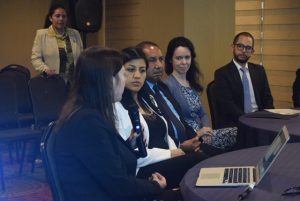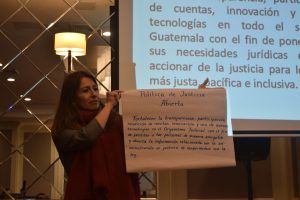Justice For All: Open Justice Moves Forward in Latin America
Justicia para Todos: La Justicia Abierta Avanza en América Latina
According to the Justice for All report of the Task Force on Justice, 4.5 billion people worldwide suffer from unmet legal needs. Concerned by these findings, government and civil society representatives from around the world met in The Hague in February 2019 under the motto #JusticeForAll: 2019 Year of JusticeTo address barriers that prevent citizens from having their justice needs met, OGP participating governments are working to expand transparency, accountability, and inclusion into all systems of justi.... They pledged to strengthen access to justiceAccessible justice systems – both formal and informal – ensure that individuals and communities with legal needs know where to go for help, obtain the help they need, and move through a system tha... More in their respective countries, with an eye on compliance with Sustainable Development Goal (SDG) 16.
Governments and judiciaries in Latin America are innovating through the implementation of open government policies, like transparencyAccording to OGP’s Articles of Governance, transparency occurs when “government-held information (including on activities and decisions) is open, comprehensive, timely, freely available to the pub... More, participation, and accountability in the justice sector. This implies a new people-centered approach: prioritize the justice problems that matter most to people, create more opportunities for them to engage in their societies and economies, and invest in what works to meet their legal needs.
Several judicial institutions in the region, such as ministries of justice, judicial powers, public prosecution and defense ministries, administrative tribunals, human rightsAn essential part of open government includes protecting the sacred freedoms and rights of all citizens, including the most vulnerable groups, and holding those who violate human rights accountable. T... offices, and others agree that the region’s current justice gap can be overcome with a more open justiceAn open, independent, and impartial justice system serves as a foundation for better access to justice by fulfilling all people’s civil liberties and allowing individuals to more effectively protect... system.

Sandra Elena discussing the open justice agenda with other reformers in the region.
Next month in October, my country, Argentina, will take over as co-chair of the Open Government Partnership. Fostering an open justice agenda will be a priority. Argentina has been committed to an open justice policy for the past four years. I am currently leading the Ministry of Justice and the country’s first open judicial data initiative: the Open Justice Program. Our Open Judicial Data Portal is an unprecedented initiative, through which databases of the Ministry and 50 judicial institutions are being published as open data. This allows for high quality, primary judicial data to be freely accessed for the first time. Likewise, the sector’s main policies are being debated and co-created with civil society through the Justice 2020 participatory platform, which already has 60,000 active members. Our experience may serve as inspiration for other countries that are moving towards open justice.
In Costa Rica, the judiciaryWhile a majority of open government reforms occur within the executive branch, OGP members are increasingly taking on commitments to increase the openness of the judicial branch. Technical specificati... is currently implementing a successful open justice policy that includes a thorough participatory grassroots model and opening up judicial data. The judiciary decided to institutionalize this initiative through a systematic action planAction plans are at the core of a government’s participation in OGP. They are the product of a co-creation process in which government and civil society jointly develop commitments to open governmen... that was co-created with civil society.
Colombia is another regional example of open justice. Since 2015, the State Council, the highest authority for administrative cases, has co-created policy commitments with civil society. These commitments cover topics such as accountability, the disclosure of financial statements by magistrates, civic participation in the election of public servants, and open dataBy opening up data and making it sharable and reusable, governments can enable informed debate, better decision making, and the development of innovative new services. Technical specifications: Polici....

The Administrative Court of Guanajuato, Mexico celebrating their 32nd anniversary with an open justice conference.
News is also coming from Mexico. The Administrative Court of Guanajuato recently joined the Electoral Court in the path towards open justice. This administrative tribunal, key in protecting people’s rights, recently celebrated their 32nd anniversary with a conference on open justice. This is their first step towards the adoption of an open justice policy.
The Judicial Branch of Guatemala, supported by the civic organization Red Ciudadana, is debating an open justice policy draft, which will be reviewed by civil society. Its approval is expected by the end of this year.
Ecuador is also moving the open justice agenda forward. Civil society, led by Fundación Ciudadanía y Desarrollo, co-created a road map for judicial reform based on open justice, which is now under debate with the authorities of the main judicial institutions for its implementation.
Countries in Latin America are using OGP as a platform to boost open justice. So far, around 15 governments in the region have made a total of 69 justice-related commitments. The experience of countries such as Argentina, Colombia or Costa Rica proves the importance of OGP as a platform to leverage both internal and external support to push forward open justice-inspired reforms.
There is still a long way ahead of us. The pending challenges are huge. Several questions need to be worked out like: How should governance in an open justice model work? What are its core components? Should we prioritize open judicial data portals, participation platforms or mechanisms providing access to justice? Are isolated initiatives enough, or is a comprehensive policy approach necessary? What is the role of international organizations in strengthening national open justice policies? What is the most effective way to advance open justice innovation strategies?
OGP, as a platform for exchange and co-creation, will play a key role in helping us find the answers. We envision OGP as a source of comparative cases on transformative country action, a place to share experiences across regions, provide knowledgeable facilitators that can foster open justice and help build a global open justice coalition.
Según el informe Justicia para Todos del Grupo de Trabajo sobre la Justicia, 4.500 millones de personas en todo el mundo sufren de necesidades jurídicas insatisfechas. Preocupados por este diagnóstico, representantes de gobiernos y sociedad civil de todo el mundo se reunieron en La Haya en febrero de 2019 bajo el lema #JusticeForAll: 2019 Year of Justice (#Justicia para todos: 2019 Año de la Justicia), donde se comprometieron a fortalecer el acceso a la justicia en sus respectivos países, con el objetivo de cumplir con el Objetivo de Desarrollo Sostenible (ODS) 16.
Los gobiernos y los poderes judiciales en América Latina están innovando a través de la implementación de políticas de gobierno abierto como la transparencia, la participación y la rendición de cuentas en el sector justicia. Esto implica un nuevo enfoque centrado en las personas: priorizar los problemas de justicia que más les importan a las personas, crear más oportunidades para estas que se involucren en sus sociedades y economías e invertir en aquello que funciona para satisfacer sus necesidades legales.
Varias instituciones del sector justicia como ministerios de justicia, poderes judiciales, ministerios públicos fiscales y de la defensa, tribunales administrativos, oficinas de derechos humanos y otros, consideran que contar con sistemas de justicia más abiertos puede contribuir a superar la actual brecha de justicia que existe en la región.

Sandra Elena discutiendo la agenda de justicia abierta con otros reformadores en la región.
El próximo mes de octubre, mi país, la Argentina, asumirá la presidencia de la Alianza para el Gobierno Abierto, y fomentar la agenda de Justicia Abierta será una prioridad. En estos últimos cuatro años, Argentina se comprometió con una política de Justicia Abierta. En la actualidad lidero desde el Ministerio de Justicia la primera iniciativa de datos judiciales abiertos del país: el Programa de Justicia Abierta. Nuestro Portal de Datos Abiertos es una iniciativa sin precedentes, a través de la cual las bases de datos del Ministerio y de más de 50 instituciones de justicia de todo el país se publican en formatos abiertos, brindando por primera vez acceso a datos judiciales primarios de alta calidad. Asimismo, las principales políticas del sector son debatidas y co-creadas con la sociedad civil a través de la plataforma participativa Justicia 2020, que ya cuenta con más de 60.000 miembros activos. Creemos que nuestra experiencia puede ser útil a otros países que también desean avanzar hacia una Justicia Abierta.
En Costa Rica, el poder judicial implementa en la actualidad de manera exitosa una política de Justicia Abierta, que incluye un modelo de base participativo y la apertura de datos judiciales. Allí, el poder judicial decidió institucionalizar esta iniciativa a través de un plan de acción sistemático que fue creado de manera conjunta con la sociedad civil.
Colombia es otro ejemplo regional de Justicia Abierta. Desde 2015, el Consejo de Estado, máxima autoridad para casos administrativos, ha co-creado compromisos de políticas públicas junto con la sociedad civil. Estos compromisos abarcan temas como rendición de cuentas, divulgación de estados financieros por parte de los magistrados, participación cívica en la elección de servidores públicos o uso de datos abiertos.

El Tribunal Administrativo de Guanajuato, México, celebra su 32° aniversario con una conferencia sobre abierta de justicia.
Desde México también nos llegan noticias. Allí, el Tribunal Administrativo del Estado de Guanajuato se sumó recientemente al Tribunal Electoral en el camino hacia una Justicia Abierta. Este tribunal administrativo, clave para proteger los derechos de las personas, celebró recientemente su 32° aniversario con una conferencia sobre Justicia Abierta, en lo que significó su primer paso hacia la adopción de esta visión.
El Poder Judicial de Guatemala, con el apoyo de la organización cívica Red Ciudadana, debate en la actualidad el borrador para una política de Justicia Abierta, que luego será evaluado por la sociedad civil. Se espera su aprobación para finales de este año.
Ecuador también avanza en esta agenda. La sociedad civil, liderada por la Fundación Ciudadanía y Desarrollo, co-creó una hoja de ruta para la reforma judicial basada en los principios de Justicia Abierta, cuya implementación es ahora debatida con las autoridades de las principales instituciones de justicia del país.
Los países de América Latina están usando a la Alianza para el Gobierno Abierta como plataforma para impulsar una Justicia Abierta: al día de hoy, unos 15 gobiernos en la región emitieron un total de 69 compromisos relacionados esta temática. La experiencia de países como la Argentina, Colombia o Costa Rica, muestra el rol fundamental de la Alianza en tanto plataforma para recabar apoyos internos y externos que permiten impulsar reformas inspiradas en la visión de Justicia Abierta.
Todavía queda un largo camino por delante y los desafíos pendientes son enormes. Varias preguntas quedan por resolver. ¿Cómo funciona la gobernanza en un modelo de Justicia Abierta? ¿Cuáles son sus componentes principales? ¿Deberíamos priorizar los portales de datos abiertos de justicia, las plataformas de participación o los mecanismos de acceso a la justicia? ¿Son suficientes las iniciativas aisladas, o es necesario un enfoque de política integral? ¿Cuál es el papel de las organizaciones internacionales en el fortalecimiento de las políticas nacionales de Justicia Abierta? ¿Cuál es la forma más efectiva de avanzar en estrategias de innovación abierta de justicia?
La Alianza, en tanto plataforma para el intercambio y la co-creación, desempeñará un papel clave en ayudarnos a encontrar las respuestas que buscamos. Hoy, la visualizamos como una instancia que permitirá seguir comparando las acciones transformadoras que se llevan a cabo en distintos países, como un espacio para compartir experiencias entre todas las regiones que la componen y como un espacio de referencia para proveer de facilitadores expertos que fomentemos la Justicia Abierta y ayudemos a construir una coalición global.


Leave a Reply